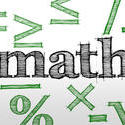 In a recent New York Times op-ed, Andrew Hacker suggested that the typical math curriculum might not really be a necessary aspect of modern education ? at least, not in the form that it currently takes. Hacker suggests that the textbook formulas found in algebra, geometry, and trigonometry classes are rarely used in ?real life,? and the high level of difficulty that many students have with these subjects might unnecessarily inflate dropout rates and cause a handful of other negative educational outcomes. As Hacker suggests, it might be beneficial to focus on the history and philosophy of mathematics or emphasize ?real life? applications of various mathematical fields, rather than zeroing in on the nitty-gritty formulas and minutiae of the math itself. After all, as he acknowledges, one of the most important reasons to learn math is not the math itself ? it is the importance of learning how to engage in deductive reasoning, problem solving, and critical analysis.
In a recent New York Times op-ed, Andrew Hacker suggested that the typical math curriculum might not really be a necessary aspect of modern education ? at least, not in the form that it currently takes. Hacker suggests that the textbook formulas found in algebra, geometry, and trigonometry classes are rarely used in ?real life,? and the high level of difficulty that many students have with these subjects might unnecessarily inflate dropout rates and cause a handful of other negative educational outcomes. As Hacker suggests, it might be beneficial to focus on the history and philosophy of mathematics or emphasize ?real life? applications of various mathematical fields, rather than zeroing in on the nitty-gritty formulas and minutiae of the math itself. After all, as he acknowledges, one of the most important reasons to learn math is not the math itself ? it is the importance of learning how to engage in deductive reasoning, problem solving, and critical analysis.
However, as fellow science blogger Joanne Manaster noted in a comment about the article, ?I?d argue that perhaps this is not so much about if math is needed, but how it is taught?geometry really helps with logic and thinking skills and algebra with general problem solving, so I don?t think it should go by the wayside altogether.?
I happen to agree enthusiastically with Manaster, and I?d like to hope that Hacker was intending for this larger pedagogical issue to be the main takeaway point for his article. I think it would be a mistake to conclude from this piece that we should simply remove algebra (or any math) from the typical school curriculum, or even that we should replace specific algebra, trigonometry, or geometry classes with broader ?quantitative literacy? courses, as Hacker suggests we should consider at one point. Rather, much as blogger and author Jennifer Ouellette did with calculus in her book The Calculus Diaries, I think the answer lies in finding ways to take this idea of ?real world applications? and using them to?help instructors continue teaching the typical lessons of the algebra, trigonometry, or geometry classrooms in a more effective manner, not using them to replace those lessons.1 Luckily, social psychology offers some theories that can help us understand how students might better learn and understand otherwise-esoteric knowledge.
In a study conducted back in the 1970s, participants were shown 40 trait adjectives (such as outgoing, moody, or adventurous). They were then asked to note either self-irrelevant characteristics of each word (e.g. the font size, sound, or definition of the word) or self-relevant characteristics (e.g. whether or not the word described their personalities). When participants were told to remember as many of the words as possible an hour later, they were significantly more likely to remember the adjectives for which they had answered the self-relevant questions. In other words, adjectives that they processed by thinking about whether or not they applied to themselves were stored better in memory than those that they had processed by thinking about characteristics like their definitions.
Research on this phenomenon, known as the self-reference effect, boils down to one main conclusion ? people are better able to remember events, facts, and knowledge when it is integrated into people?s self-concepts. If you process a speech, fact, problem, or mathematical postulate by personalizing it and applying it to your own life, you?ll be more likely to think about that information, remember it, and recall it later. Integrating information into pre-existing knowledge structures makes it easier to recall, and when it comes to our memory, there is no knowledge structure that is better established than the one containing information about our favorite subject: Ourselves.
But it doesn?t stop there. Not only do we process self-related information better, we understand things better when they?re situated within a social context as well.

As an example, look at the image on the left. Let?s say you need to prove (or disprove) the claim that if a card shows an even number on one face, then its opposite face must be red. Which card(s) must you turn over to test this?
Most people will say that you need to turn over two cards ? the card with the 8, and the solid red card. However, this isn?t correct. In order to test the claim, you do need to turn over the 8 to ensure that the opposite face is red. But, you don?t need to turn over the red card. You need to turn over the green card. You must ensure that the green card does not have an even number on the other side, or else that would invalidate the claim. It doesn?t actually matter what number is on the other side of the red card.
Whether or not you got this correct, the fact of the matter is that most people don?t. In fact, when this experiment was conducted, fewer than 10% of the subjects came up with the correct response. However, what if I asked the question this way?

You walk into a bar. You need to make sure that everyone drinking alcohol is over 21. Each card shown here has a customer?s age on one side, and what he/she is drinking on the other. Which card(s) must you turn over to enforce this rule?
All of a sudden, the answer seems obvious ? and most people quickly figure out the solution. You need to turn over the ?16,? to make sure that the 16-year-old is not drinking beer, and you need to turn over the ?Drinking Beer? card, to make sure that the person drinking it is not underage. It doesn?t matter how old the person drinking soda is, nor does it matter what the 25-year-old is drinking.

Photo by Edwin Land via Flickr
This task is exactly the same as the first one ? with one key difference. The latter task involves?social information. The researchers who ran this variation of the first task (formally known as the Wason Card Selection Task) confirmed that when it comes to deductive reasoning, we simply process social information better than other types of knowledge. Once you place the logic test in a bar with underage drinkers, it suddenly becomes easy to figure out its solution.
We?ve now learned that people process, understand, and remember information better when it is presented in one of two ways ? when it pertains to the self, and when it?s situated within a social context. If we can characterize human nature in any universal way, it would be that we are predominantly self-concerned and social creatures. This means that making knowledge relevant to the self or relevant to a social situation should make it easier to understand, remember, and apply.
What?s important to note is that this doesn?t necessarily mean changing the content of the instruction. I think that Hacker is on to something by suggesting that we should be applying all of these mathematical concepts to students? lives, but this doesn?t mean that we have to replace formulas and postulates with applications that are as literal as his suggestions. Making something self-relevant could be as simple as asking students to spend 5 minutes thinking about how they might use a certain mathematical concept in the future jobs they would like to hold or advising students to create mnemonic devices for formulas that incorporate the names of the students? friends and families. Making something socially relevant is simply a matter of creative framing. After all, in the demonstration above with the two card tasks, the second card task was testing the exact same logical reasoning process as the first one ? it simply framed the question differently.
There?s no need to fundamentally alter the content of our mathematics curriculum, even if its current format is flawed. Applying mathematical concepts to people?s ?real lives? does not necessitate throwing the baby out with the bathwater. We can keep teaching current algebra, trigonometry, and geometry content in our schools, and we can even teach them better ? as long as these lessons are constructed with the audience?s two chief concerns in mind.
1. As you might guess, I?m probably biased towards this strategy seeing as the idea of taking pop culture/real life situations and using them to explain & understand science is?the entire point of this blog.
![]()
Rogers, T.B., Kuiper, N.A., & Kirker, W.S. (1977). Self-Reference and the Encoding of Personal Information. Journal of Personality and Social Psychology, 35 DOI: 10.1037//0022-3514.35.9.677
Klein, S. B., & Loftus, J. (1988). The nature of self-referrent encoding: The contribution of elaborative and organizational processes. Journal of Personality and Social Psychology
Wason, P. C., & Shapiro, D. (1971). Natural and contrived experience in a reasoning problem. Quarterly Journal of Experimental Psychology, 23 DOI: 10.1080/00335557143000068
Cosmides, L. (1989). The logic of social exchange: Has natural selection shaped how humans reason? Studies with the Wason selection task. Cognition DOI: 10.1016/0010-0277(89)90023-1
Source: http://psysociety.wordpress.com/2012/07/29/algebra-is-necessary/
j.k. rowling j.k. rowling axl rose google earnings pat burrell hilary rosen grilled cheese
No comments:
Post a Comment
Note: Only a member of this blog may post a comment.